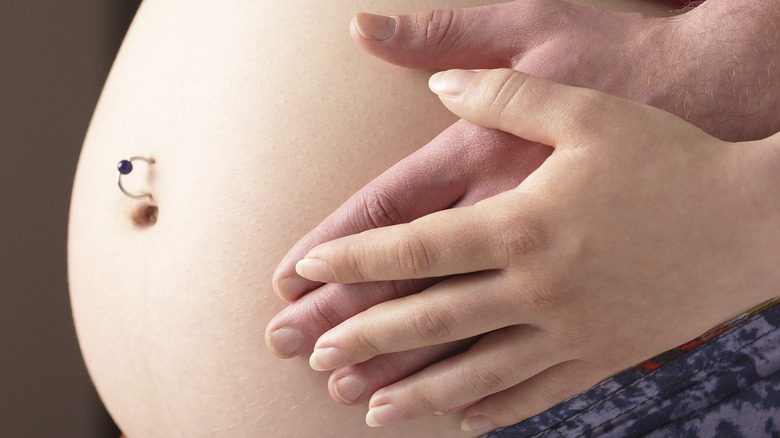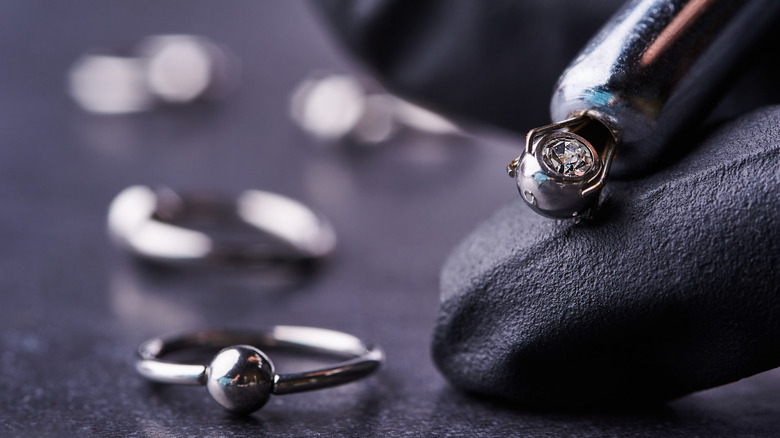Is It Safe To Get A Piercing While Pregnant?
While professional piercings are generally considered safe, any type of piercing can potentially lead to complications. These can range from an allergic reaction to the type of jewelry used to possible infection or disease from tools that weren't properly sterilized. Even if you take any and all possible precautions, are there specific risks to getting a piercing during pregnancy?
While there is no rule against getting a piercing while pregnant, experts generally advise against it due to a patient's lowered immunity during pregnancy. This makes their body more susceptible to potential infection (via BabyCenter). In serious cases, infection from a piercing that makes its way into the bloodstream may also be harmful for the growing fetus, as their immune system is still developing.
Alternatively, skin infections are also of particular concern during pregnancy. OB/GYN Dr. Cynthia Flynn tells Romper that piercing-related skin infections are not uncommon. "Cellulitis or skin infection occurs about 20% of the time," Dr. Flynn told the publication. "This is easy to treat when you are not pregnant, but the presence of the fetus or baby can complicate treatment."
Avoid these types of piercings in particular
While getting piercings of any variety is not generally advised while pregnant, the American Pregnancy Association says that belly button piercings, nipple piercings, and genital piercings are best avoided, in particular. These piercing holes may not get enough time to fully heal before the skin begins to stretch — and as the hole grows, so does the risk for infection. On average, piercings can take anywhere from three months to half a year to heal completely (via BabyCenter).
Additionally, OB/GYN Dr. Kim Langdon tells Romper that the increased skin sensitivity experienced during pregnancy can make piercings in sites like the nipples or genitals especially painful. Nipple piercings can pose their own unique risks during pregnancy, as well. This includes infection in the milk ducts, breast tissue inflammation, or skin damage if your new piercing snags on clothing or a bath towel.
As an alternative, you might be thinking, well, what about nose or ear piercings? Surely those come with fewer risks, right? As it turns out, ear piercings still carry the same infection risks as any other piercing. They may even be more risky if a piercing gun is used, as these are challenging to clean. Nose piercings pose drawbacks too, as they can make pregnancy symptoms like a stuffy nose even more uncomfortable.
What about piercings you already have?
If you've had a beloved piercing for years now, there's no need to remove it during pregnancy, according to experts at BabyCenter. In some cases, however, a pre-existing belly button ring may cause discomfort as the body grows. Therefore, some people opt to remove it voluntarily. If you keep it intact, just remember to keep it clean in order to reduce the chances of infection.
Conversely, some experts suggest doing away with a belly button piercing jewelry as the patient's due date approaches. "You have to remove the piercings before labor and delivery in the case of an emergency cesarean," Dr. Langdon tells Romper. "The electrical equipment will cause a burn if you leave them in."
So when is a pregnant patient considered in the clear to get a new piercing? Generally speaking, wait at least three months following birth before seeking out any new body jewelry. Professional piercers likely won't pierce a pregnant customer anyway, due to the potential risks.



